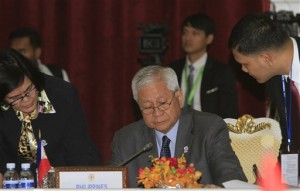MANILA, Philippines–Foreign Secretary Albert del Rosario has instructed the Philippine Embassy in Beijing to check on China’s reported plan to fortify the newly established Sansha City saying any such move would violate agreed conduct among claimant countries to the Spratly Islands.
Chinese newspapers, meanwhile, called out Manila and other countries involved in island disputes with Beijing for “provocations” in disputed seas as they justified the fortification of the controversial Sansha City and the upgrade of China’s naval forces.
In a statement sent to the Inquirer, Del Rosario said he has asked the Philippine post in Beijing to confirm reports that China will invest $1.6 billion to develop Sansha City, an administrative domain established to govern territories in the Spratlys.
“We are requesting our Beijing post to validate the information. We trust this is not the case since, if true, this would be in gross violation of the DOC (Declaration of Conduct of Parties in the South China Sea),” Del Rosario said Thursday.
The DOC is a 10-year-old document that aims to deter use of force and instead promote peace and self-restraint among countries claiming resource-rich territories in the South China Sea, including China, Vietnam, Malaysia, Brunei, Taiwan and the Philippines.
The Philippines calls part of the South China Sea within its exclusive economic zone (EEZ) as the West Philippine Sea.
China, which claims almost all of the Spratlys, established Sansha City as a prefecture of Hainan Province in June to govern the disputed islands. The Philippines protested this move, saying this was “unacceptable” as the city’s administrative scope covered areas within its EEZ.
The same southern Chinese province, located closest to the disputed waters, announced earlier this month that its law enforcers would start interdiction of foreign ships in the South China Sea on Tuesday, Jan. 1, 2013.
Del Rosario said China has yet to respond to the foreign office’s request for official clarification of the new policing law, which would allow Hainan authorities to board and search foreign ships that would pass by South China Sea, a critical trading route.
“We have officially asked for a clarification from the Chinese Embassy in Manila and as well asked our Beijing post to directly contact their (Chinese) foreign ministry. Until now, we are still awaiting an official response,” del Rosario said.
Standing by China’s moves that have stirred regional tensions, two Chinese newspapers criticized the Philippines and other countries involved in the island disputes for “provocations” in the South China Sea.
In separate editorials, the Global Times and China Daily asserted China’s right to secure its sovereignty and criticized the Philippines, Vietnam and Japan for what they described as provocative moves as the nations pushed for their claims in the South China and East China Sea.
The Global Times opinion writer Yu Jincui said in a piece published Thursday that China’s plan to develop Sansha City was aimed at bolstering the country’s southern maritime defense.
“The resolve to build Sansha is firm. It sends the message that China will not only respond to any provocation but will be proactive,” Yu said.
“Establishing the city is the first step, followed by the immediate task of developing Sansha into a solid frontier to protect China’s territory, which includes islands and undersea atolls in the South China Sea region,” he added.
He said the establishment of Sansha City was a response to “provocations” of counter-claimants Vietnam and the Philippines.
“The disputes in the South China Sea have intensified as Vietnam and the Philippines have been seeking to break the status quo by provocatively developing the area. Establishing Sansha City is China’s reaction to their provocations. China is now securing its sovereignty,” said Yu.
The China Daily meanwhile said China’s efforts to develop its Navy should not set off alarm bells in the region. The newspaper instead criticized neighbors for posing a threat to China’s security.
The paper specifically cited the Philippines, a vocal claimant to the Spratlys, and Japan, with which the Chinese have a dispute over East China Sea islands, in justifying China’s need to bulk up its naval muscle.
“The provocation of countries like Japan and the Philippines who covet Chinese islands and waters has complicated and even worsened the country’s security environment. The need to usher in a better security environment in its vicinity highlights the fact that its capabilities have fallen far behind its needs,” the editorial read.
The paper said other countries should not be overly concerned about China’s moves to beef up its maritime power.
“The higher visibility of the Chinese navy has aroused concerns and even wild speculation overseas… It is unnecessary to overreact or read too much into China’s efforts to build itself into a maritime power,” said the editorial.
“China does not seek hegemony. It will not pose a threat to others. Its resolve to enhance its defense forces only serves its need to cultivate a good security environment for its peaceful development,” the paper said.


